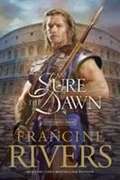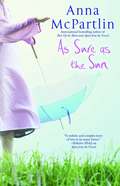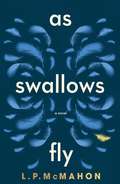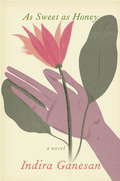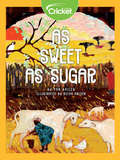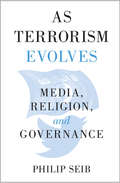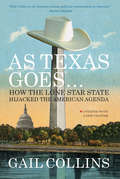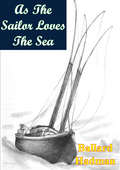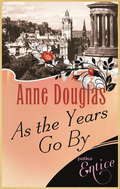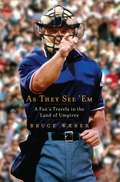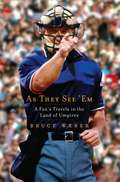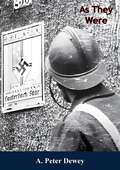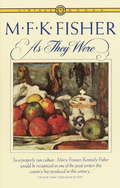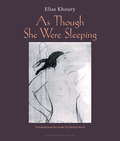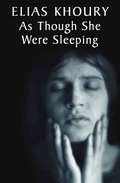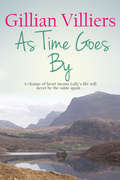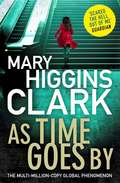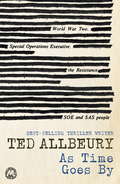- Table View
- List View
As Sure as the Dawn (Mark of the Lion #3)
by Francine RiversWhen Atretes wins his freedom from the gladiator's arena, he finds his long-lost son in the care of a young Christian widow. But Rome's corrupt political powers soon force him to fight again---this time for himself and his newfound family.
As Sure as the Sun
by Anna McpartlinWhen bride-to-be Harri Ryan ends up at the ER with a panic attack on her wedding day, her twin brother, George, jokes that she's the most glamorous patient there. But this is no joke. It's Harri's second try at the wedding, and when she returns to her Dublin apartment, her fiancé, James, has already packed his belongings. Harri doesn't want to lose him, but she doesn't know how to convince James it won't happen a third time.
As Swallows Fly
by L.P. McMahonWhen Malika, a young orphan in rural Pakistan, is savagely attacked, her face is left disfigured and her self-esteem destroyed. Haunted by the assault, she hides from the world, finding solace in her mathematical theories. A few years later, her intellectual brilliance is discovered and she leaves conflict-stricken Pakistan for a better education in Melbourne, where she finds herself placed with Kate—a successful plastic surgeon facing emotional insecurities of her own. Malika and Kate&’s lives slowly intertwine as they find within each other what each has lacked alone. At first, Kate&’s skills appear to offer a simple solution to Malika&’s anguish, but when tragedy strikes, the price of beauty is found to be much higher than either of them could have known. As Swallows Fly is a poignant portrayal of survival, identity and empowerment in a culture dominated by the pursuit of perfection. In a captivating and unforgettable debut, McMahon asks what might be possible if we have the courage to be flawed.
As Sweet as Honey
by Indira GanesanIn her latest novel, Indira Ganesan, a writer often likened to Arundhati Roy and Chitra Divakaruni (see back of jacket for reviews), gives us an enchanting story of family life that is a dance of love and grief and rebirth set on a gorgeous island in the Indian Ocean. The island is filled with exotic flora and fauna and perfumed air. A large family compound is presided over by a benign, stalwart grandmother. There is a very tall South Asian heroine with the astonishing un-Indian name of Meterling, who has found love at last in the shape of a short, round, elegant Englishman who wears white suits. There are also numerous aunts, uncles, and young cousins--among them, Mina, grown now, and telling this story of a marriage ceremony that ends with a widowed bride who, in the midst of her grief, discovers she is pregnant. While enjoying their own games and growing pains, Mina and her young cousins follow every nuance of gossip, trying to puzzle out what is going on with their favorite aunt, particularly when the groom's cousin arrives from England and begins to woo her. As Meterling--torn between Eastern and Western ideas of love and family, duty and loyalty--struggles to make a new life, we become as entranced with this family, its adventures and complications, as Mina is. And with her we celebrate a time and place where, although sometimes difficult, life was for the most part as sweet as honey.
As Sweet as Sugar
by Pam BailesKorinko and Mejooli are two brothers from Kenya. In this story, they venture out into the wild to collect honey from a beehive. And with the help of the trusty Honeyguide bird, they are successful.
As Terrorism Evolves: Media, Religion, and Governance
by Seib PhilipSome of the world's most lethal terrorist organizations have become media-centric enterprises, while also hijacking a major world religion, holding large swathes of physical territory, and governing their own virtual states. In this concise and penetrating book, Seib traces how terrorism has proliferated and increased significantly in menace in the relatively brief period between the rise of al-Qaeda and the creation of Islamic State. With close attention to the linkages between media, religion, and violence, the book offers incisive analysis of how organizations such as Islamic State, al-Qaeda, and Boko Haram operate and reflects on how terrorism may continue to evolve. Seib argues that twenty-first-century terrorism is enabled by new media and depends on social networks as connective tissue, while interacting simultaneously with religion and socio-economic and political grievances. As Terrorism Evolves prescribes new measures for counterterrorism efforts, underscores the importance of soft power, and makes a strong case for recognizing that we have entered an era of terrorism of undetermined duration.
As Texas Goes...: How the Lone Star State Hijacked the American Agenda
by Gail Collins"Gail Collins is the funniest serious political commentator in America. Reading As Texas Goes... is pure pleasure from page one." --Rachel Maddow As Texas Goes . . . provides a trenchant yet often hilarious look into American politics and the disproportional influence of Texas, which has become the model for not just the Tea Party but also the Republican Party. Now with an expanded introduction and a new concluding chapter that will assess the influence of the Texas way of thinking on the 2012 election, Collins shows how the presidential race devolved into a clash between the so-called "empty places" and the crowded places that became a central theme in her book. The expanded edition will also feature more examples of the Texas style, such as Governor Rick Perry's nearsighted refusal to accept federal Medicaid funding as well as the proposed ban on teaching "critical thinking" in the classroom. As Texas Goes . . . will prove to be even more relevant to American politics by the dawn of a new political era in January 2013.
As The Sailor Loves The Sea
by Ballard HadmanDescribed in graphic & amusing detail, making a living from the sea. The artistic Ms. Hadman went to Alaska in 1938 to paint and draw, but while there met and married a fisherman in the Southeast. Here she tells of their isolated life in the village of Craig, and later in Sitka (hardly a metropolis then, either); of how she too became fisherfolk and a native, and how the War affected them and their neighbors.
As The Twig Is Bent
by Kenneth Jernigan"Table of Contents To Park Or Not To Park What Lynden Has To Hear How Different It Might Have Been How Different It Is Do You Want To Go To The Store, Ted? Partially Sighted, Really Blind Advice From A Seven-Year-Old A Matter Of Attitude A Purchasing Alliance They Didn't Want Me To Go To School Ladies And Gentlemen Of The Jury Sight Unseen To Light A Candle With Mathematics Supremacy." Other books in this series are available from Bookshare.
As The Years Go By
by Anne DouglasForced by the post-war boom to leave their shabby Edinburgh tenement for a new bungalow on the outskirts on the city, Madge Gilbride is comforted by the fact that at least she has her family near her. And when her grandsons, Will and Hamish, fall in love with local girls she is delighted. But life is not sailing- especially for Will. In love with the fiery Kate Rossie, he discovers she wants both a husband and a politcal career. Conventional Will makes a choice he will regret for years- a sensible marriage of convenience to the suitable Sara. As she watches her grand-children with their own families joys and troubles, Madge can't help but remember her old tenement home and hope that the new generation of Gilbrides never forget their roots...
As The Years Go By
by Anne DouglasForced by the post-war boom to leave their shabby Edinburgh tenement for a new bungalow on the outskirts on the city, Madge Gilbride is comforted by the fact that at least she has her family near her. And when her grandsons, Will and Hamish, fall in love with local girls she is delighted. But life is not sailing- especially for Will. In love with the fiery Kate Rossie, he discovers she wants both a husband and a politcal career. Conventional Will makes a choice he will regret for years- a sensible marriage of convenience to the suitable Sara. As she watches her grand-children with their own families joys and troubles, Madge can't help but remember her old tenement home and hope that the new generation of Gilbrides never forget their roots...
As They See 'Em
by Bruce WeberPacked with fascinating facts, Weber's book is the ultimate insider's look into the small and largely unknown world of baseball's professional umpires
As They See 'Em: A Fan's Travels In The Land Of Umpires
by Bruce WeberMillions of American baseball fans know, with absolute certainty, that umpires are simply overpaid galoots who are doing an easy job badly. Millions of American baseball fans are wrong. "As They See 'Em" is an insider's look at the largely unknown world of professional umpires, the small group of men (and the very occasional woman) who make sure America's favorite pastime is conducted in a manner that is clean, crisp, and true. Bruce Weber, a New York Times reporter, not only interviewed dozens of professional umpires but entered their world, trained to become an umpire, and then spent a season working games from Little League to big league spring training.
As They Were
by A. Peter DeweyAS THEY WERE By LT. COL. A. PETER DEWEYWith the war ended, too many people have already forgotten the dark and uncertain days France knew in 1939-40. But Lieutenant-Colonel Dewey did not forget. He was not the sort of American who could live through such a period and fail to remember. In the simplicity of his book, he has shaped the terror and dissolution of a great people and country. Other writers have told of the corruption in the highest levels of French politics and society; other writers have spoken of the courage that far outweighed the treachery. But none has been able to catch the fevered hopelessness, the panic of those two years. As a Paris correspondent, Dewey was in a position to observe and analyze, and gasp in amazement, at the events which led to the brutal transformation of a great power into a defeated crushed nation. But he has wisely stayed away from the cut-and-dried analyses of political maneuvers and results. He has concentrated upon these hectic days as they affected the individual. His interest was on a human level—the small personal tragedies as well as the great, the death of a child along a refugee-clogged road as well as the decimation of a regiment.AS THEY WERE is not only the story of the early days of this late war as it has never been told before; it is also the story of a sensitive, wise young man who managed to combine an almost delicate culture and a classic intellect with practical ability. Peter Dewey is now dead—killed in action, while serving as a Lieutenant-Colonel in the OSS. He died as courageously as he lived, his physical daring surpassed only by his moral courage. Of his book, Arthur Krock has said: “This is one of the most absorbing accounts of what happened in France in 1939 and 1940 that I have seen—deftly woven into the story of a gallant personal experience are the tragic elements of the debacle.”
As They Were
by M. F. K. FisherThis marvelous collection of autobiographical essays by the celebrated, much-adored Fisher covers her life, family, food and adventures.
As Though She Were Sleeping
by Marilyn Booth Elias KhouryMilia's response to her new husband Mansour and to the Arab World of 1947 is to close her eyes and drift into parallel worlds. Identities shift. Present, past, and future mingle and merge: she finds herself able to converse with the dead and foresee the future. As the novel progresses in glimpses, Milia's dreams become more navigable than the strange and obstinate "reality" in which she finds herself, and the two realms grow ever more entangled. This wondrous tapestry of love, faith, history, poetry, and vision cuts to the very heart of the deep-rooted conflicts of the region and breaks new literary ground.
As Though She Were Sleeping
by Elias KhouryMeelya's dreams are her refuge from events that threaten her or escape her understanding. She leaves her home in Lebanon to live in Nazareth with her Palestinian husband, but Mansour - an older man who fell for her beauty - is frustrated by her spiritual absence.When Mansour's brother's death demands a move to Jaffa - the centre of early tensions between Jewish settlers and displaced Palestinians - Meelya withdraws further into the realm of dreams. Expecting the birth of their son, Mansour can only watch as she cuts loose from the physical world.Over three traumatic nights, past, present and future merge seamlessly into a series of visions that draw the reader towards a conclusion that is powerfully symbolic of the ongoing troubles in the Middle East.
As Thousands Cheer: The Life of Irving Berlin
by Laurence BergreenThis is the life story of Irving Berlin, from his arrival in the United States, through his childhood, and development as one of the country's greatest composers.
As Time Goes By
by Gillian VilliersA touching and heart-warming romance with a beautiful Scottish setting.When Lally has to house-sit her grandmother's croft in the wildest part of Scotland with her scatter-brained sister Bel, she fully expects to return soon to her high-powered Edinburgh job. Bel has other plans, though, and Lally quickly finds the people and the place seeping into her soul. Or is it just one person, in the shape of new neighbour Iain? Torn between two worlds, Lally has a decision to make - one that could change her life for ever...
As Time Goes By
by Gillian VilliersA touching and heart-warming romance with a beautiful Scottish setting.When Lally has to house-sit her grandmother's croft in the wildest part of Scotland with her scatter-brained sister Bel, she fully expects to return soon to her high-powered Edinburgh job. Bel has other plans, though, and Lally quickly finds the people and the place seeping into her soul. Or is it just one person, in the shape of new neighbour Iain? Torn between two worlds, Lally has a decision to make - one that could change her life for ever...
As Time Goes By
by Mary Higgins Clark<P>Television journalist Delaney Wright is on the brink of stardom after she begins covering a sensational murder trial for the news. She should be thrilled, yet her growing desire to locate her birth mother consumes her thoughts. <P> On trial for murder is Betsy Grant, widow of a wealthy doctor who has been an Alzheimer's victim for eight years. When her once-upon-a-time celebrity lawyer urges her to accept a plea bargain, Betsy refuses: she will go to trial to prove her innocence. <P> Betsy's stepson, Alan Grant, bides his time nervously as the trial begins. His substantial inheritance hangs in the balance--his only means of making good on payments he owes his ex-wife, his children, and increasingly angry creditors. <P> As the trial unfolds, and the damning evidence against Betsy piles up, Delaney is convinced that Betsy is not guilty and frantically tries to prove her innocence, before time runs out... <P><b>A New York Times Bestseller</b>
As Time Goes By
by Ted AllbeuryIn 1942 three young women are parachuted into the Dordogne to work for a Special Operations Executive network. Their leader is Harry Bailey,a young man who loves one of them and fears for them all.Paulette, the passionately committed Frenchwoman, who never forgets her need for revenge against the Germans... down-to-earth Vi, motivated by an unselfish sense of obligation... Jenny, the least committed of the three, and the one who must find the most courage.As the months of dangerous waiting turn at last into active combat behind enemy lines as D-Day approaches, the three heroines' story moves to its unforgettable climax.'Striking... he makes the menacing atmosphere of wartime France startlingly real' - Daily Telegraph
As Time Goes By
by Ted AllbeuryIn 1942 three young women are parachuted into the Dordogne to work for a Special Operations Executive network. Their leader is Harry Bailey,a young man who loves one of them and fears for them all.Paulette, the passionately committed Frenchwoman, who never forgets her need for revenge against the Germans... down-to-earth Vi, motivated by an unselfish sense of obligation... Jenny, the least committed of the three, and the one who must find the most courage.As the months of dangerous waiting turn at last into active combat behind enemy lines as D-Day approaches, the three heroines' story moves to its unforgettable climax.'Striking... he makes the menacing atmosphere of wartime France startlingly real' - Daily Telegraph
As Time Goes By (Tales From Grace Chapel Inn #46)
by Annie JonesOn the Sunday after Christmas, Rev. Thompson makes a plea in his sermon for his congregants to step up when they hear the Lord's call. The Howard sisters take the pastor's words to heart and wait, ready and eager. But when their calls come, they are surprised at the unexpected territory they must visit. Jane must help a blustering newcomer settle into Acorn Hill, Alice takes on a paid speaking engagement and Louise gets involved in helping young married couples. Persevering in their tasks, they open themselves to new experiences and to surprising insights about love, patience and kindness. Once you visit the charming village of Acorn Hill, tucked away in rural Pennsylvania, you'll never want to leave. Townsfolk relax on their porch swings or gather to discuss the day's events at the Coffee Shop over homemade pie. It's the kind of town where friendship and faith flow together like a wide river on a fine spring day. And you'll love spending time with the Howard sisters, who have begun a new life together in their childhood home, a gracious Victorian house that is now a bed-and-breakfast called Grace Chapel Inn. Here they rekindle old memories, rediscover the bonds of sisterhood, revel in the blessings of friendship and meet many fascinating guests along the way.
